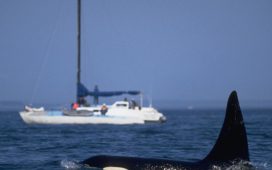The California government has acknowledged it has been unable to enforce its ban on selling kangaroo leather products, after an animal protection group alleged sports retailers and manufacturers, including Nike and Puma, were selling football boots made from the Australian marsupial’s skin there.
An investigation by the Center for a Humane Economy found 93% of “dominant” online retailers were “illegally” sending kangaroo leather products into California, which has banned their import and sale since 2015.
The investigation was solely focused on California, as the kangaroo leather trade is not illegal in the rest of the US. Australia has strict rules for the legal harvesting of the marsupial, which accounts for an export market worth about A$175m.
The California Department of Fish and Wildlife told the Guardian it was overwhelmed by the task of policing sales of more “egregious” animal products, including ivory and rhinoceros horn. It has urged its citizens to report any suspected sales of kangaroo skin to authorities.
California introduced the law in 1971 and it remains the only US state to have a ban on selling kangaroo products, a common material used in football boots, baseball mitts and gloves sold around the world. A moratorium allowed the animal products to be traded in the state from 2007 until the ban was reimposed in 2015.
Breaches of the law – which also extends to products from animals such as zebras, whales and monkeys – can be punished with fines of between US$1,000 (A$1,400) and US$5,000 and six months’ imprisonment.
The Maryland-based centre’s investigation also alleged that the manufacturers’ own online stores were delivering the products to customers in the state. When investigators ordered boots online, to be delivered to addresses in Los Angeles, seven of nine manufacturers, including Nike and Puma, fulfilled the orders.
But the investigation found there was “almost perfect compliance” with the kangaroo leather policy by four manufacturers that operated factory stores in California, including Nike and Puma.
Adidas, which was not found to be delivering to customers directly in the state, was named in the report because its kangaroo leather shoes were on sale in third-party California shops. Adidas denied it breached the law by selling wholesale to those retailers. An Adidas spokesman told the Guardian it “has strict protocols in place to prohibit sales, including wholesale sales, of athletic shoes featuring kangaroo leather in California”.
The investigation also acknowledged Nike “temporarily took steps to come into compliance after notified of violations by the Center, but resumed illegal sales” in July.
Nike and Puma did not respond to the Guardian’s request for comment. Nike says of its policy on its website: “Kangaroos – If wild caught, must be sourced from actively managed populations with government agency oversight.” Puma’s website says it has a target of “zero use of exotic skins or hides” by 2025.
The centre is calling for a “crackdown” on the trade, claiming the “vast violations” of the law by the retailers have allowed California’s economy to fuel further kangaroo slaughter.
Its president, Wayne Pacelle, said: “We’re not making hats from herons and egrets, we don’t decorate our living rooms with ivory trinkets, and we shouldn’t wear athletic shoes made from the skins of kangaroos.
“There’s just no need for it. Every one of these companies already sells soccer cleats made from fabrics not stripped from the backs of wildlife.”
In light of the investigation, five athletes – including the 2012 Olympic cycling silver medallist Dotsie Bausch and the New Zealand national team footballer Katie Rood – wrote to Nike’s chief executive, John Donahoe, urging his company to end the use of kangaroo skin in athletic shoes.
The captain of the California Department of Fish and Wildlife’s law enforcement division, Patrick Foy, said a six-person wildlife trafficking unit was set up in 2015 but it targeted the “most egregious” trades, including of elephant ivory and rhinoceros horn, species facing extinction and “live animal markets where there could be a potential of species carrying diseases to humans”.
“The United States is the second-largest consumer of trafficked wildlife in the world,” Foy said. “California has some of the largest seaports in the US with a population of approximately 40 million people.
“While it is our goal to always protect the public and all species of wildlife, we must consider the reality of the overwhelming workload versus our current resources. We remain vigilant in our efforts and ask the public to help. Our department has a tip line for anyone to advise us of a violation of poaching and pollution laws.”
Four Australian states – New South Wales, Queensland, South Australia and Western Australia – allow commercial harvesting of kangaroos. In 2018 the quota was set at 15%, or 6.9 million kangaroos of a total of 46.1 million, but the actual take was 1.5 million, or 3%.
The sight of malnourished kangaroos moving closer to populated areas in search of food during droughts has prompted calls from some scientists to cull the marsupials as a humane measure.
In 2014 kangaroo meat and skin exports were valued at $174m, with estimates that the market generated more than 2,000 jobs.
As the moratorium on the ban was nearing its end in 2015, the Australian government launched a campaign to extend it indefinitely to expand the US export market for kangaroo products.
But its bid failed, and California’s Fair Political Practices Commission issued the Australian government a warning for not declaring $143,000 in funding used to lobby California politicians.
In 2019 the Italian fashion giant Versace announced it had stopped the use of kangaroo fur in its goods.













